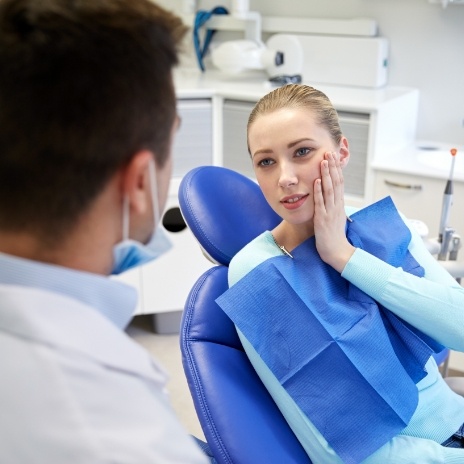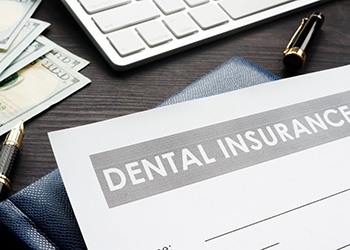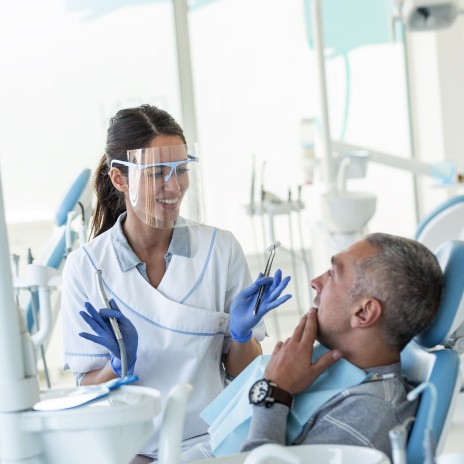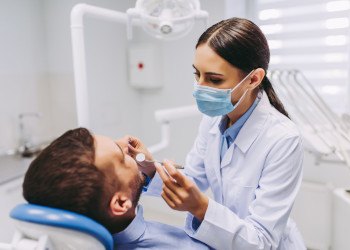Emergency Dentist – Alpharetta, GA
Fast, Pain-Relieving Dentistry That You Can Rely On
Dental emergencies spring up at the most inconvenient moments, leaving you to stress and panic about what to do next. With our trusted and accommodating team at Alpharetta Modern Dentistry, you can get the timely care you need as soon as possible, whether it’s on the weekend, after-hours, or the same day you call. We also offer dental sedation in case you feel especially anxious or fearful of coming in. That way, you can take care of the situation without being in distress. Call us immediately if you need an emergency dentist in Alpharetta!
Why Choose Alpharetta Modern Dentistry for Emergency Dentistry?
- Same-Day & After-Hours Emergency Dentistry
- Nitrous Oxide Sedation Available
- Multiple, Flexible Ways to Pay
How We Treat Dental Emergencies

- Call Us: The first step you should take if you damage a tooth, experience oral pain, or notice any out-of-the-ordinary symptoms is to call our dental office. Regardless of when you experience the problem, you’ll be able to get ahold of one of our team members to schedule a visit, whether that’s during or after hours.
- Come in for an Examination: Once you schedule an emergency appointment, you can come in to receive a thorough examination from our team. This can include digital X-rays or a cone beam CT scan as well as a physical evaluation from our skilled emergency dentist.
- Go Through Your Treatment Options: Based on our findings, we’ll provide you with a diagnosis and walk you through your treatment options, as well as all of your payment methods. Our practice is happy to accept PPO dental insurance plans and offers a convenient in-office membership.
- Receive the Care You Need: Finally, our team will get to work erasing your pain and restoring your smile.
The Most Common Dental Emergencies
If you’re concerned about whether or not you should be seeking emergency dentistry, we recommend giving us a call. Our team can help you navigate your situation and help you determine whether your symptoms require urgent attention. We’ve also included some of the most common emergencies that we see below.
Understanding the Cost of Dental Emergencies

Dental emergencies always seem to pop up when you least expect them. This means that it can be difficult to anticipate the cost of your treatment, so many people worry about seeking help. Our team at Alpharetta Modern Dentistry wants to make the process as smooth and affordable as possible, so we’re here to help! We won’t be able to determine the exact cost of your treatment until we diagnose the issue. Then, we can discuss the cost and your payment options in detail so that you don’t run into any surprises. Until then, here are some things for you to take into consideration.
Every Dental Emergency Is Different

Because no two dental emergencies are the same, there’s no set price tag associated with these visits. It will depend on several factors, including whether you require diagnostic imaging, which treatment you need, and whether you receive dental sedation. Based on all of these, our team will be able to provide you with a cost estimate once you arrive and we’ve made a diagnosis.
Does Dental Insurance Cover Dental Emergencies?

In the majority of cases, dental insurance providers agree to cover emergency dental services. The amount they cover is based on the type of restorative treatment you need. It is best to reach out to your provider to confirm your coverage. We’d also be happy to help you with this process. Our team at Alpharetta Modern Dentistry is proud to be in-network with many PPO dental insurance companies. We’re also happy to file a claim on your behalf to ensure you receive maximum reimbursement from your PPO dental insurance plan.
Other Options for Making Dental Emergencies Affordable

If you don’t have dental insurance, this doesn’t necessarily mean that you will be left completely on your own. We currently have a special for a $99 Limited Emergency Exam and X-Rays. By joining our In-House Wellness Plan, you can enjoy many of the benefits of dental insurance for a flat annual fee. This includes 2 emergency exams and discounts on treatments completed at our practice. We are also happy to accept payments through CareCredit – a third-party financing company that can split the cost of your treatment into manageable monthly installments with little to no interest. To learn more about your financial options, don’t hesitate to reach out to one of our friendly team members.
Keys to Preventing Dental Emergencies

If there was just one thing you could do to completely avoid experiencing a dental emergency, we would tell you. The reality is that you need to commit to several preventive measures in order to reduce your chances of a crack in your enamel, a knocked-out tooth, or another serious injury. With this in mind, keep reading to learn what you can do to protect your smile from harm!
Visit Your Dentist Every Six Months

At your biannual visits to our Alpharetta dental office, Dr. Valeria Labastida and Dr. Ashish Kakadia cover a lot of ground – from looking for warning signs of oral cancer to providing helpful feedback on how to keep your smile healthy at home. They also thoroughly examine your teeth and gums to ensure that common oral health problems, like tooth decay, haven’t surfaced. If they have, then they will provide the necessary restorative care ASAP.
Maintain a Good At-Home Dental Hygiene Routine

Of course, you need to take good care of your smile at home too! That starts with using a soft-bristled toothbrush and fluoridated toothpaste to brush your teeth each morning and evening (and for a full two minutes each time). You also need to floss at least once a day and rinse with an antimicrobial mouthwash regularly. That way, a cavity doesn’t develop between your teeth and plaque doesn’t build-up along your gumline.
Stick to a Well-Balanced Diet

Eating vitamin-rich foods, like fresh vegetables and seasonal fruits, is essential when it comes to keeping your oral and overall health in tip-top shape. So, make sure to include them in each of your meals and snacks. It’s also important that you don’t over-indulge in foods that are high in carbohydrates or sugars in an effort to avoid common oral health problems, like cavities.
Protect Your Teeth During Sports

Do you participate in a contact sport, like football? Maybe you prefer staying active with a solo activity, like rollerblading or skateboarding. Whatever the case may be, you need to wear a mouthguard in order to protect your smile from harm. If you don’t have one, contact us instead of buying one from a sporting goods store since those are one-size-fits-all.
Don’t Use Your Teeth as Tools

When the scissors aren’t within reach and your hands aren’t doing the trick, you might be tempted to use your teeth to tear open plastic wrapping or remove a bottle cap. Don’t! This can quickly lead to a serious dental injury, like a fractured tooth. For the same reason, we don’t recommend smoking, biting your nails, or chewing on ice cubes.
Dental Emergency FAQs
How Should I Sleep with Tooth Pain?
If you’re struggling with a toothache – whether it’s dull and consistent or sharp and stabbing – you should contact our emergency dentist in Alpharetta ASAP. If you can’t come in the same day for treatment, then you’ll be happy to know that there are a few measures you can take to alleviate your pain in the short term. In addition to avoiding crunchy, acidic, and sugary foods, take OTC pain medication as directed and keep your head elevated while you sleep.
What if My Toothache Suddenly Disappears?
Unfortunately, this is not a good sign. If you’ve been struggling with a toothache for several days, weeks, or months, and it suddenly goes away, it’s likely because the nerve has been “killed” by an infection. Not only does this mean there is only a small window of time where your tooth can be saved, but it means that your surrounding teeth and gums are now at-risk. For those reasons, we recommend scheduling an emergency appointment with us right away.
Should I Visit the Emergency Room First for Dental Emergencies?
If your dental injury is accompanied by potentially life-threatening symptoms, like difficulty breathing or uncontrollable bleeding, then you should definitely visit the ER. If you aren’t experiencing any potentially life-threatening symptoms, however, then your first call should be to your dentist. If you reside in or around Alpharetta and you don’t have a dental team to turn to, don’t hesitate to give us a call! Our top-rated dental office is open five days a week, and we offer morning, lunchtime, and afternoon appointments. So, there’s a good chance we’ll be able to see you the same day you call for an exam.
Should I Worry About a Chipped Tooth If It Doesn’t Hurt?
A chipped tooth that doesn’t hurt may not require a same-day visit to our office, but it does warrant a visit! After all, we need to make sure that an infection doesn’t develop. Plus, we want to restore the missing structure, even if the tooth in question is toward the back of your mouth. Simply put, even if you aren’t in pain, you should make calling us a priority.
What If I Can’t Afford Emergency Dentistry?
It’s common for patients to be worried about the cost of their care, especially if they need extensive restorative and/or cosmetic dentistry. The good news is that our team at Alpharetta Modern Dentistry welcomes several financial solutions, including dental insurance and our in-house wellness plan, which makes the cost fit into nearly every budget.
What Should I Do If I Knock Out a Tooth?
A knocked-out tooth isn’t just a dental injury; it’s a dental injury that needs to be addressed within the hour. Otherwise, the chances of us being able to save your tooth are next to impossible. That’s why we recommend contacting us ASAP and following the instructions we give you over the phone, like placing the tooth in a clean container filled with milk.
I Need a Checkup & Cleaning I am Worried About Gum Disease I Have a Cavity or Broken Tooth I am Missing One or More Teeth I Want to Enhance My Smile I Want a Straighter Smile View Our Services
